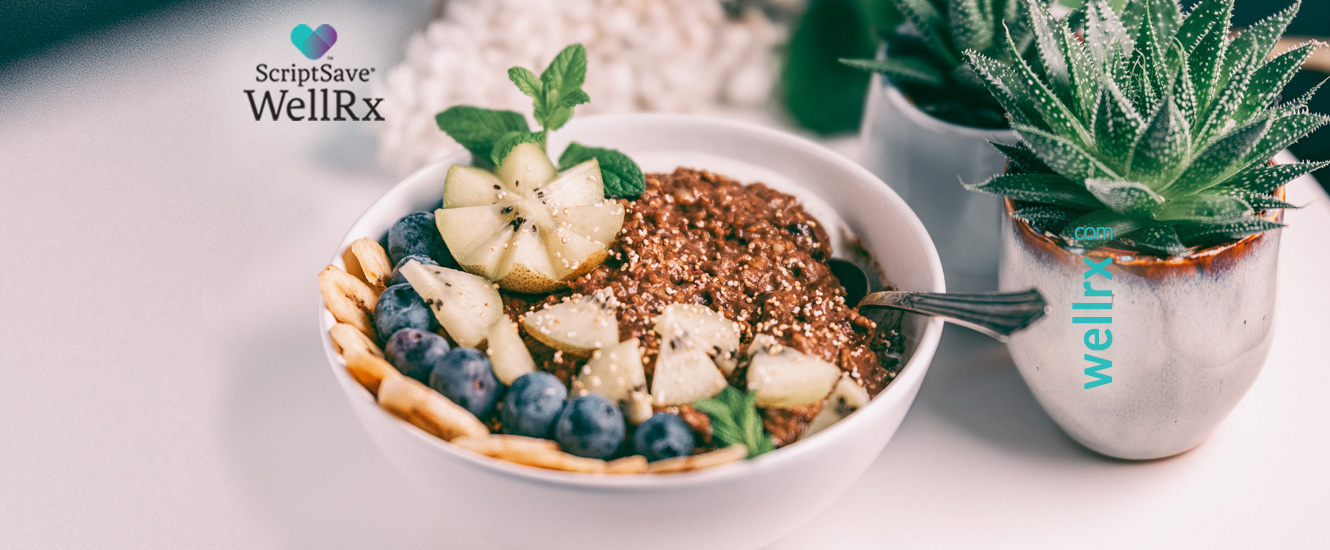Heart disease is the leading cause of death in the United States, with the most common type of heart disease being coronary artery disease (CAD). However, you can make dietary interventions to protect against heart disease.
Fiber is an advantageous part of the diet from a heart-health perspective. Consuming enough fiber helps to reduce the risk of heart disease as it helps to pull low-density lipoprotein (LDL) out of the arteries. Read on to learn more about which foods can help increase your fiber intake and protect your heart.
How Much Will You Save on Your Prescriptions?
Vegetables
Vegetables are a great source of fiber. Because they are indigestible carbohydrate that passes through the body without being broken down, they help protect the heart. Consuming these indigestible, high-fiber foods pulls the plaque out of the arteries, helping fight against heart disease. Both soluble and insoluble types of fiber have been linked to heart health.
Vegetables, such as spinach, broccoli, brussels sprouts, carrots, and green beans, contain certain insoluble fiber types, helping promote healthy blood pressure and cholesterol levels. Due to these properties, the fiber becomes a helpful accomplice when fighting against heart disease. While recommendations vary based on age and gender, it is generally recommended to consume ~30 grams of fiber each day to reap ultimate heart-health benefits.
To help quantify and put this into perspective, 1 cup of cooked spinach is about 4 grams of fiber, ½ cup of broccoli is about 3 grams of fiber, a medium artichoke is about 6 grams of fiber, and ½ cup of canned pumpkin about 5 grams of fiber.
To help increase your fiber intake with vegetables, experiment with some of these meal and snack ideas:
- Breakfast: scrambled eggs with sautéed spinach
- Snack: celery with peanut butter
- Lunch: salad with a protein of choice
- Snack: grilled artichoke hearts (used as an appetizer) served with light dipping sauce
- Dinner: protein, rice, and roasted broccoli (drizzled with extra virgin olive oil)
Whole grains
Another high-fiber food group to include for heart health is whole grains. Whole grains provide many nutritious benefits (especially compared to their white flour counter-products), such as being a great source providing a little bit of extra protein and B vitamins, pro boosting your fiber intake.
Picking whole grain-based carbohydrates is also helpful for blood sugar management, as whole grains help mediate the response that carbs have on blood sugar. So, the higher the fiber, the lower the carbs, as you can subtract fiber from total carbohydrates. (An example of this would be: if a cereal has 20 grams of carbohydrates per serving and 8 grams of fiber per serving, the net carbohydrate count would be 12 grams per serving).
A few ways to add more whole grains into your daily routine could look like:
- Breakfast: whole-grain toast with eggs
- Snack: whole-grain crackers with cheese
- Lunch: brown rice in a stir fry with veggies and chicken
- Snack: yogurt and granola
- Dinner: brown rice noodles with pasta and meatballs
Beans
Research shows a direct correlation between intake of beans and regulation of blood pressure/maintaining a healthy heart. This was especially true when people susceptible and/or fighting heart disease swapped out red meat intake for bean-based meals. As a result, individuals consumed less saturated fat from eating less red meat and got a big fiber boost by upping their bean intake.
The great news when it comes to beans is that you can experiment with many different varieties and bean-based products to try to increase your fiber intake. To help increase your bean consumption, experiment with some of these meal and snack ideas:
- Breakfast: burrito with eggs, potatoes, and black beans
- Veggies with hummus or bean-dip
- Spinach salad with grilled salmon and kidney beans
- Teriyaki chicken stir fry with roasted broccoli and edamame beans
In general, fiber is a helpful, health- and heart-promoting dietary element with many benefits. If you have been recently diagnosed with heart disease, are genetically predisposed to heart disease, and/or simply want a more heart-healthy approach to your nutrition, use some of the ideas listed above to help increase your fiber intake. To help set yourself up for success, focus on how you can add one additional fiber serving to your daily routine and build up from there. Report back, which source of fiber do you most enjoy?
Jordan Stachel holds a Master’s degree in Nutrition and Dietetics from The University of Southern California and is a Registered Dietitian Nutritionist. She has several years of experience helping clients reach their health goals through her clinical work within private practice. Jordan is most fulfilled when guiding others towards making stepwise, sustainable changes that add up to big results over time. Jordan works with a wide variety of individuals, ranging in age from children to the elderly, with various concerns and clinical conditions. She helps individuals optimize overall health and/or manage disease states using personalized medical nutrition therapy techniques.
References:
- https://www.cdc.gov/heartdisease/about.htm
- https://www.health.harvard.edu/heart-health/eat-more-fiber-rich-foods-to-foster-heart-health
- https://www.med.umich.edu/mott/pdf/mott-fiber-chart.pdf
- https://www.health.harvard.edu/heart-health/to-lower-heart-disease-risk-swap-beef-for-beans













 Store & manage your medication list
Store & manage your medication list Medication pricing updates
Medication pricing updates Pill & refill reminders
Pill & refill reminders Medication journal & mood log
Medication journal & mood log